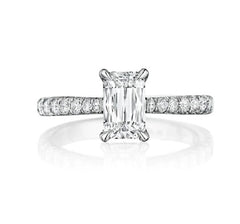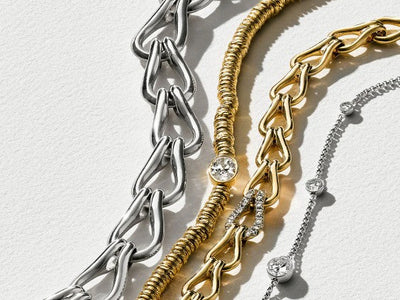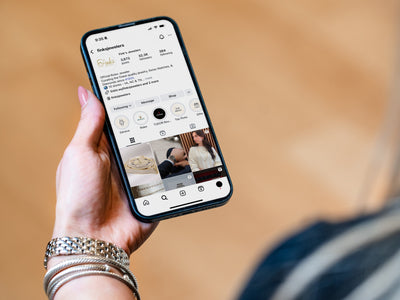Diamond buying is an exciting experience in your life, but it can come with challenges. Shopping for the perfect diamond for an engagement ring or creating a fine jewelry piece for a special occasion should be approached with care.
We want to help you make this an unforgettable adventure by providing you with knowledge and arming you with the top questions you should be asking when shopping for your diamond. We'll walk you through everything you need to know, from evaluating diamond quality and understanding diamond type to available options for protecting your investment.
Beginning Your Diamond Engagement Ring Search
When buying diamond jewelry, take a moment to sit down and make a list of your finances, priorities, and ideas you have brewing in your head. Carefully consider your budget, as you certainly don’t want to over-extend yourself on an engagement ring. This will help you stay within your limit should you get carried away when you see the brilliant cuts and carats available to you. We know how quickly you can fall in love with a gorgeous two-carat diamond, but staying within your budget will always be the smarter path to take when buying diamond jewelry.
Next, jot down all you know about your significant other’s taste in jewelry. Do you know the style of engagement ring she is dreaming of? Are there preferences she’s shared about metal, setting, shape, or diamond quality? Have you had discussions of diamond type or color in the past? You may come to find you are heading out with more direction for buying a diamond than you first gave yourself credit for!
Lastly, review this handy diamond buying guide to educate yourself on purchasing a quality diamond engagement ring. You’ll begin to prioritize which aspects are most meaningful to you. You’ll also get a feel for which areas you would like to learn more about as you narrow down your selections. Above all else, savor this time and remember what awaits you after buying your diamond ring!
Let’s dive into essential questions you should ask when buying a diamond.
What is Diamond Type, and Does it Matter When Buying a Diamond?
Diamond type may have several meanings, depending on how technical you’d like to get. Ultimately, understanding diamond type will help you select a high-quality stone with the price point and characteristics you value most.
Diamond type refers to the scientific method gemologists use for classifying diamonds according to the level and type of each stone’s chemical impurities. Each diamond begins formation from a carbon base. As it grows, the atoms from additional elements become a part of this base. These atoms, which are typically nitrogen, can come together in clusters, affecting the stone’s appearance, color, and overall diamond quality.
As you browse for the perfect engagement ring or prepare to buy diamond jewelry, careful consideration should be given to diamond type. Ask the jeweler to explain the diamond types for the engagement rings you are admiring. They should be ready and willing to provide you with this information and a GIA certificate.
How is Diamond Type Measured?
There are four diamond types a stone can be placed in:
- Type Ia
- Type IIa
- Type IIb
- Type IIb
Unlike an inclusion, infrared spectrometers are required to measure the impurities which classify a diamond type. Educating yourself on the classification types will help you select a high-quality diamond that suits your needs when buying diamond jewelry. Characteristics of each diamond type include:
- Type Ia Diamonds
Perhaps the most common diamond type you’ll find when buying a diamond ring, these diamonds contain larger clusters of nitrogen within the crystal lattice. The clusters cause the Ia diamond type to emit a yellow tone as the light from the spectrum's blue range is absorbed by the nitrogen atoms. Their absorption of ultraviolet and infrared light, along with their fluorescence, are what Type Ia's are best known for. They make up approximately 98% of natural diamonds.
- Type IIa Diamonds
Type IIa diamonds do not emit a yellow or brown tint, as they do not have visible light absorption due to a near lack of nitrogen. This diamond type differs in its level of fluorescence and is formed under extreme pressure. Type IIa diamonds are typically the vibrant, fancy colored diamonds you envision when buying a diamond that has some color - they make exquisite engagement ring center stones.
- Type Ib Diamonds
The Type Ib diamond contains single nitrogen atoms that are scattered throughout the crystal lattice. They emit a vibrant yellow color as large amounts of blue light are absorbed. These are a great choice when buying a diamond for a lady that loves a splash of sunny yellow.
- Type IIb Diamonds
Type IIb diamonds contain boron rather than nitrogen. These diamonds emit a blue or blue-grey color as boron absorbs light from the spectrum's red end. Type IIb stones are extremely valuable and only account for roughly 0.1% of all-natural diamonds and offer exceptional diamond quality, so keep your eyes out for these when buying a diamond.
What is Diamond Quality, and Why is It Important When Buying Diamond Jewelry?
Diamond quality encompasses many aspects, each affecting the price and appearance of your engagement ring, so it’s good to understand how to measure quality when you’re buying a diamond. Gemologists use the GIA’s 4Cs grading system to evaluate and rate diamond quality systematically. This system ensures diamond quality, type, and value according to its characteristics and rarity. Naturally, some Cs may be of greater value to you and your significant other. Keep these in mind as you compare each stone and narrow down your selections to buy a diamond.
What are the 4Cs of a Diamond?
- Color
- Cut
- Clarity
- Carat
Here are additional questions you may want to ask regarding diamond quality when buying diamond jewelry:
Does Diamond Color Variation Affect Diamond Quality?
The color differences between diamonds can range from subtle to drastic. Even when placing two stones side by side with identical weight, cut, and clarity, their color differences may be worlds apart. This difference may have tremendous weight on your preference, as well as the price tag when buying a diamond.
Color variations do affect the overall diamond quality rating. Your jeweler should allow you to compare the stones under the same conditions—lighting, background, and engagement ring setting—for an accurate comparison when buying diamond jewelry.
Diamonds within the normal color range may vary from colorless to pale yellow or brown. Even within that range, the colorless diamond is the most valuable, as it is also the rarest. Asking to see and compare similar diamonds with color variation for yourself when buying diamonds will help you determine where color is on your list of diamond quality priorities.
Does a Diamond’s Cut Affect Diamond Quality?
Often mistaken for shape, the cut of a diamond refers to:
- the diamond’s proportions
- the various angles
- how well the diamond’s facets can interact with light
While you may be dazzled by the first engagement ring that catches your eye when buying a diamond ring, a proper comparison of all diamonds should be made to help you determine the cut you are searching for. We guarantee you’ll see and value the difference in diamond cuts once you have the chance to compare them for yourself.
When buying diamond jewelry, keep in mind that a diamond’s cut plays an essential role in the way it interacts with and performs in light. It can be the difference between a dull, dark stone and a colorful, brilliant sparkle that is sure to turn heads, affecting the overall diamond quality rating. Precise diamond cuts will determine a stone’s:
- fire: the colorful flash or scattering of light
- brightness: the reflection of white light both internally and externally
- scintillation: the pattern produced by the diamond’s sparkle due to its internal reflections
May I Examine the Clarity of the Diamonds I Have Narrowed Down When Buying a Diamond?
Its overall clarity also influences diamond quality. All diamonds will have their unique imperfections. While some blemishes and inclusions can be seen with the naked eye, others require a more in-depth look. The degree of clarity of your stone may or may not be high on your priority list, but it’s certainly worth asking to evaluate for yourself when buying diamond jewelry.
An inclusion refers to the stone’s internal features, while a blemish refers to irregularities found on the stone's surface. Blemishes also include scratches and chips. Even minor characteristics can have a significant effect on diamond quality and value. Your jeweler should be more than happy to demonstrate how to view, compare, and evaluate the clarity of the stones you are considering when buying a diamond.
Why Do Diamonds Listed with the Same Carat Weight Look so Different?
When comparing carat weight, there is much more to consider when buying diamond jewelry than meets the eye. On paper, two diamonds may be the same carat weight yet look completely different sizes to the naked eye.
The weight of a diamond is typically confused with its size. Yet, if you recall, the cut of a stone can enhance the appearance of the diamond’s size. The metric carat offers a precise way to weigh diamonds, regardless of their perceived size, compared to a similarly weighted stone. Metric carat weight is broken down into one hundred points, representing one hundredth of a carat. When buying diamond jewelry, note that the slightest fraction of a difference in a carat can significantly affect its price point.
When buying a diamond, don’t be afraid to ask your jeweler to point out the differences in carat weight and cut by showing you a variety of options that are within your price range. You may be pleasantly surprised by what the comparisons reveal.
Additional Questions to Ask When Buying Diamonds
Is This Diamond Enhanced or Treated?
For some, knowing if a stone’s inclusions or blemishes have been treated is essential when buying diamond jewelry. Treatments to a stone can help boost diamond quality ratings. It allows the clarity of a diamond to be enhanced or corrected through the professional use of lasers and other advanced technology equipment.
Do You have the Grading Report for the Diamonds I’m Looking At?
Ensuring diamond type and diamond quality are essential with an engagement ring investment. Ask your jeweler if your diamond comes with a grading report from an independent, accredited gemological laboratory. The independently generated report, often provided by GIA, ensures the diamond type, quality, value, and authenticity, so you can trust you’re buying a diamond of quality.
Do You Offer Custom Engagement Ring Options?
Designing the engagement ring of their dreams is a romantic way to add that special touch. Creating a one-of-a-kind engagement ring is an option we are delighted to offer here at Fink’s Jewelers. Even if you don’t have the complete design envisioned, we are here to make your ideas become a reality!
The perfect custom engagement ring may begin with a family heirloom, an image, or a doodle of a specific diamond type you found in her journal. Whatever the case may be, we have a team of designers ready to meet your custom engagement ring desires when you’re ready to buy a diamond ring.

Creating a custom engagement ring isn’t just for those who have a vision. Perhaps you've been on your quest to buy a diamond ring and still haven't found the one that speaks to you. Our team of design experts is happy to sit with you and draft ideas. From selecting the right precious metal to ensuring diamond quality, we’ll help you create a unique engagement ring.
Do You Provide Jewelry Repair Services?
While this is an excellent question to ask when buying diamond jewelry, it should be followed up by other essential questions, including:
Will You Perform My Repairs In-store or Send Them Out?
Peace of mind is crucial. There’s nothing wrong with asking who will be performing any necessary repairs on your engagement ring. While many jewelers do send out their clients’ repairs, this may be a deciding factor for you. Keep in mind that off-site repairs may add additional wait time or incur higher repair prices.
Is the Jeweler or Technician Repairing My Engagement Ring Bench Certified?
Not everyone is comfortable handing over their engagement ring. It’s important to feel comfortable asking if your jewelry repairs will be done by someone with professional certification. National standards are set in place to help clients feel confident with their fine jewelry repairs. Ask if your jeweler’s repair team has a Bench Professional Certification.
Do You Offer a Lifetime Guarantee for Those Buying Diamond Jewelry?
If you buy your diamond through a reputable jeweler, you will typically be offered a lifetime guarantee, covering replacements of your diamond should it be lost under certain circumstances. You will usually be required to maintain routine inspections and cleanings with the jeweler to keep your warranty valid.
Do You Offer an Upgrade Program?
While this may not be an option in your immediate future, it’s certainly worth inquiring about for future reference when buying a diamond. Many engagement ring center stones are eligible for an upgrade, so don’t forget to ask!
You’re ready to head out and begin your search for the perfect engagement ring. Ask questions until you feel comfortable enough to make a decision; buying diamond jewelry is a big and very special purchase!














